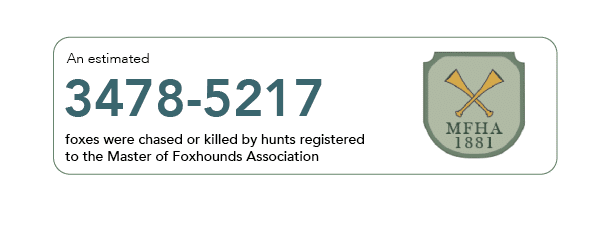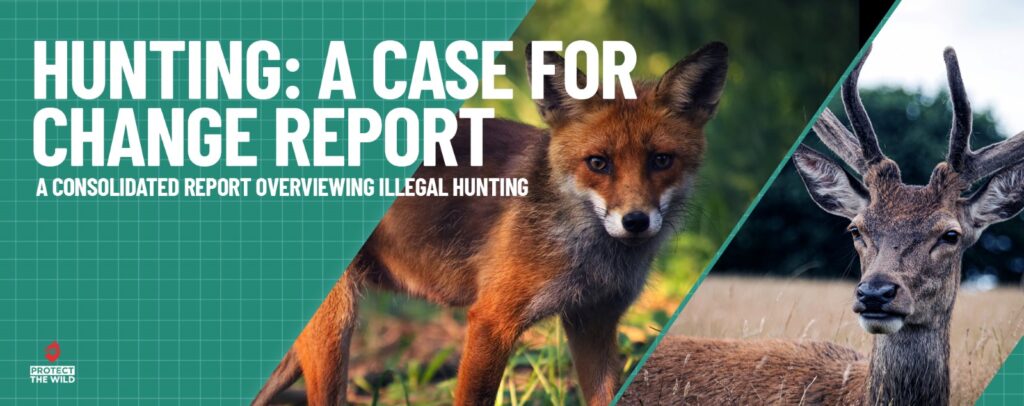Protect the Wild recently published “Hunting: A Case for Change“, a 50-page report that offers a thorough examination of hunting practices during the 2022/23 season, focusing predominantly on fox, hare, and deer hunting in England and Wales.
Author Glen Black utilised a combination of online data from anti-hunting groups, public reports, and activist observations to evaluate the prevalence and impact of hunting on wildlife, communities, and individuals.
“Hunting: A Case for Change” underscores persistent violations and the far-reaching implications on wildlife populations, local communities, and the wider general public, which we are now looking at in a series of posts.
- Download ‘Hunting: A Case for Change’ as a pdf.

The Hunting Act 2004 was supposed to ban the hunting of wild mammals with dogs in England and Wales. No animal should be chased – that is the law. But as pro-wildlife campaigners have been saying for the two decades since the Act was passed, the hunting (of foxes, deer, and hares in particular) has continued pretty much as before.
Many of the key findings of “Hunting: A Case for Change” reinforce that fact.
Bearing in mind that few Hunts are monitored or sabbed on every occasion they go out – meaning that there is no possibility that every Hunt or every meet was actually recorded and could therefore be collated for the Report – Black still found that an estimated 15,180 meets took place in the period between 1 August 2022 and 30 April 2023! That’s a staggering figure for a banned ‘sport’ where something like only one-third of all hunts were attended by activists, campaigners or members of the public.
Hunts and the Master of Foxhounds Association (MFHA, hunting self-styled ‘governing body’) will say that vast total means very little because (they claim) all hunts now legally ‘trail hunt’ – following a scent trail laid ahead of the hunt. To quote their website, the MFHA “represents 170 packs that hunt within the law in England and Wales and a further 8 in Scotland“.
But that’s simply untrue. So-called ‘trail hunting’ didn’t exist before the Hunting Act. It is widely used as a ‘smokescreen’ behind which traditional hunting takes place. If trails are laid (and there has been scant evidence to prove that happens very often), it’s typically for very short distances and routinely near coverts where the hunt knows target animals will be.
The MFHA is either utterly incompetent or won’t acknowledge the facts, because “Hunting: A Case for Change” destroys hunting’s version of events. The total of 15,180 meets includes 2000+ hare hunting meets, but looking at fox hunting alone of the around 13,000 fox hunts that were recorded during those nine months of the year at least 3478 (and as many as 5217) foxes were chased or killed by hunts registered to the MFHA itself.

The Report picks out two hunts that are notorious for breaking the law. The statistics for just one of those hunts, the Warwickshire, are remarkable. This Hunt (which was placed under a Community Protection Notice for continual anti-social behaviour in December 2022 so ‘missed’ a few meets around then) rode out an estimated 130 times throughout the ‘hunting season’ including many ‘cubbing’ meets where the Hunt focussed on killing fox cubs.
As the Report says,
“The Warwickshire Hunt chased multiple foxes during some meets. As a result, the figures…represent 29 meets throughout the season. That means 22.3% of the Warwickshire Hunt’s meets resulted in some sort of chase or kill. Most if not all of these would have been under criminal circumstances.”

Black also drilled down into the mountain of online reports to determine the percentage of Hunts registered to the ‘governing body’ (which “provides day to day support, guidance and supervision for all recognised hunts”) that were implicated in illegal hunting.
He found that almost HALF had been caught chasing or killing foxes in the 2022/23 hunting ‘season’.
As the Report says (and the MFHA and other hunting lobbyists need to understand):
“The hunting industry has had nearly 20 years to alter its behaviour but it is clear that very little on the ground has changed in this time. Moreover, it has continuously attempted to cover up its true intentions, suggesting a wilful and widespread commitment to illegal activity.”
Wildlife needs a Proper Ban on Hunting
As previously stated, there is little evidence suggesting that the Hunting Act has changed the intentions and attitudes of the hunting industry at all. Sabbing and monitoring has influenced hunting’s behaviour and led to the folding of numerous hunts over the years, but widespread evidence from the 2022/23 season – such as the shocking videos (filmed by hunt support themselves) of the Avon Vale Hunt digging out two foxes – proves that hunts will continue chasing and killing wildlife so long as they’re not being observed.
“Hunting: A Case for Change” looks at several options to improve this appalling situation, and concludes that:
“a new law needs to stop hunts from going out in the first place, as it’s clear that hunts aren’t interested in trying to change their behaviour if they’re out in the field“.
That new law is our proposed ‘Hunting of Mammals Bill’, which:
- will ban so-called ‘trail hunting’ by making it a crime to hunt any mammal with a dog using any animal-based scent (so hunts will no longer be able to claim it is a ‘legal activity’).
- will make it a crime to ‘intentionally or recklessly’ hunt a wild mammal with a dog.
- will make it a crime for a landowner to ‘assist’ a hunt by ‘knowingly causing or permitting’ a hunting crime to take place on their land.
- will increase ‘search and seizure’ powers meaning that police will have the power to take vehicles and mobile phones from hunts in the field.
- will make relevant ‘organisations and bodies corporate’ (such as hunts registered as businesses) and officers within those organisations liable for crimes committed by hunts.
- will give courts the powers to ‘deprive’ hunts of any horses or dogs used to commit hunting crimes (with provisions to ensure the welfare of any animal taken).
- will allow the ‘forfeiture’ of any ‘hunting article’ used to commit a hunting crime.
- will enable courts to ‘disqualify’ individuals committing hunting crimes from owning or transporting animals used in hunting or making any arrangements in connection with hunting.
- will at last include ‘searching’ for an animal in the definition of hunting.
- will tighten legal definitions, for example, of who is responsible for any dog used in hunting, who owns or is responsible for land used by hunts, and removes any ‘Royal Clause’ loophole by stating that when passed the new Act will apply to ‘anything done on or in respect of land irrespective of whether it belongs to or is used for the purposes of the Crown or a Duchy’.
- Our new Bill is far more than just an update of the Hunting Act 2004. Now is the time to work for a proper ban on hunting! Sign our petition for a proper ban on all hunting with hounds. More than 79,000 people have taken action so far. Help us to get to 100,000 signatures. Add your name here.
SPECIAL ACKNOWLEDGEMENT
This report wouldn’t have been possible without the courageous monitors and saboteurs out in the field standing up to the hunts. Their tireless work throughout the hunting season and their dedication in writing reports on their experiences continues to be absolutely vital. Without direct action the public cannot be shown what really goes on in the British countryside. To thank the brave sabs and monitors who witnessed all of this first hand, please consider supporting your local hunt saboteur or monitor group.


